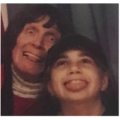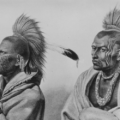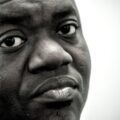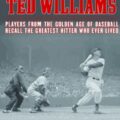Memory Care: A Personal Essay

My grandmother, who is 101 years old, calls her assisted living facility The Finishing School. There you buy your apartment only to have ownership revert to the corporation upon death, so they can glue down replacement carpet, slap on a fresh coat of paint, and sell it to a new owner. Despite the guaranteed temporary nature of their stay, people move in their most beautiful things: claw-footed antique tables, Wedgewood china, damask wingback chairs.
Perched on one of the green hills ringing Huntington, West Virginia, the castle-like brick building boasts turrets, awnings, and frothy stretches of scalloped white siding that seem to insist on the word gingerbread. Out front are rocking chairs and fountains; out back, ponds with two resident ducks that my grandfather, when he was alive, named Frick and Frack. They lived there for fifteen years together. For eleven years, my grandmother has lived there alone.
The Finishing School is a festive place where people decorate their doors and the hallway alcoves outside their apartments. My kids love to visit, especially in December, when three-foot high nutcrackers and miniature sparkly trees materialize amid the carved cats and golfer statuettes. They thump down the hushed halls in search of the next dish of peppermints, the next elfin display. This place puzzles them, though. “Is this a hotel?” my daughter asked once. And my son: “Is this another country?”
Even in the healthcare wing, where my grandmother now lives, people decorate their doorways. A large ceramic goose wears a floppy, handsewn bonnet at Easter, holly sprigs and an acrylic Santa beard at Christmas. On a table, two Barbies clutch each other in perpetual jolly surprise, arms and legs splayed as if mid-fall. Their outfits change from poodle skirts to chiffon evening gowns, depending on the day. You can visit The Finishing School for years before you ever see the healthcare wing.
I like walking the halls almost as much as my kids do. People discuss the weather constantly but rarely go outside. Some work, with grudging determination, on half-finished puzzles scattered around common areas; others stop to watch, as at a ping pong match. Cocktails are served at 4:30, dinner at 5:00, in the formal dining room where women in mint green and tulip pink cardigans glide on walkers, strands of pearls girding their crepe-paper necks. In the corridor outside the dining room is the carpeted “parking lot,” where residents leave scooters in narrow spaces marked off with electrical tape. A short, air-conditioned van idles outside the automatic glass doors to take residents down the hill to doctors’ appointments or Food Lion. When I visit, I take lots of naps.
Because my grandfather had always been zany—whistling his way into a room, where he’d say “Howdy doo-dy,” poke you in the ribs, make one of his dozen signature noises, get the glass of water he’d come for, and head out—for years we overlooked his memory loss.
Once our chief storyteller, the person whose running commentary everyone wanted to hear, he now repeated the same story within an hour. He would be chatting along and then stop, his blank look a cross between confusion and hostility. A few seconds after his abrupt retreat to the den, we’d hear the upbeat voice of a TV sports announcer. My grandmother covered and compensated for him, as she had throughout their life together for his colorblindness, laying out the next day’s shirt and tie each night.
Even when they left a family reunion abruptly, we chalked it up to my grandfather’s impatience with other people’s agendas. They left while most of us were on a walk, without saying goodbye. We decided it must have been the baby-centric chatter about pack-n-plays and disposable versus cloth diapers that had made them leave.
After he died, though, my grandmother recalled that day in a letter to me: “Going back to Lewisburg it was sad to hear Bob say, ‘Who were all of those people?’” Is this a hotel? Is this another country?
“It’s easier for everyone if his routines are undisturbed,” my grandmother said, which we understood to be her gentle way of disinviting us from overnight visits in their two-bedroom apartment.
We stayed instead at the Ramada a few exits down the highway, with its paper cups of batter to pour into the waffle iron propped on a counter in the lobby.
Eventually my grandmother proposed, “Why don’t we just meet for lunch in Beckley?”
We always met at Tamarack, a craft gallery and restaurant off I-77, a few hours’ drive for each of us. In winter, the West Virginia turnpike is dreary, marred by grinding trucks and the brutal evidence of coal mining along the mountainsides. In the spring, this same road turns glorious, mountain green pierced with frequent shining waterfalls that needle down to the asphalt. Inside Tamarack are enormous carved bears, glass-blown ornaments, and bright quilts that manage to be neither traditional nor modern.
One of these visits came on the cusp of spring, a cold day that defied winter, not with anything so obvious as warmth, but a suggestion in the air of something gentler to come. I had brought along my new puppy, Saati.
“You say have a dog out there?” my grandfather asked several times as we ate.
To make up for his having to stay in the car, I had saved my trout skin to smuggle out to Saati in a napkin, still warm and greasy, like an organ. My grandfather came with me. He wanted to see the dog.
We sat on a low wall overlooking the parking lot while my glossy black dog gobbled the fish skin. Grinning, my grandfather whistled in admiration at how fast the fish disappeared. He ran his tanned hand over the dog’s fur.
“This is a nice dog,” he said. “What’s its name?
“Saati,” I said. “It means friend in Nepali.”
“Nepali?!” He gave me a look that could go either way: he may or may not have remembered that I’d lived in Nepal for two years. Then he said, “I had a dog once. Ted.”
“What kind of dog was he?” I asked, even though I knew all about Ted from the stories my grandfather used to tell. Asking about Ted turned the knob, made my grandfather’s voice sound like it used to. He could still describe how he and Ted used to hide under the house together for hours when he got in trouble, which was often. As a six-year-old living in the small town of New Martinsville, on the banks of the Ohio River, he once got caught smoking a cigarette and spent the rest of the day hiding in a rain barrel. Another time he walked into the bank, saw the open safe, and helped himself to a roll of dimes, which he spent at the drugstore on a toy sailboat. The youngest of five boys and by his own admission no angel, my grandfather often heard his mother say, “Go down and play in the river.” He did, with Ted.
“Ted was sort of a beagle,” my grandfather said. “A mutt. I took him everywhere with me.”
Tucked away in some undamaged portion of his brain, my grandfather could recall with clarity days when he was only five. Watching him pet Saati, I tried to imagine his eyes in a 5-year-old’s face. No one had bothered to give him a middle name in 1918, when he was born, so upon starting school, he picked his own. He chose “Friend.”
“This is a nice dog,” my grandfather said again as we sat under the dishrag sky. “What’s its name?”
For decades, my grandfather received gifts from us, his family, in that peculiar manner of modern American consumption that confuses knowing what people like with knowing who people are. He liked trains: we gave him conductor’s caps and whistles and books on the railroad’s history. He liked rivers and steamboats: we gave him dry VHS tapes about commerce on the Ohio River. He liked watching birds out the window: we gave him bird feeders and binoculars and even a bird clock, which marked each hour with a different bird call. When my brother heard the red-winged blackbird sing out at 9 o’clock, he commented, “That’s an exciting clock you’ve got there.” My grandfather shot the clock a withering look and said, “Well, it’s not something I look forward to.”
In return, my grandfather gave us his stories. They often seemed embellished, like the one about the car he and his friends “borrowed” that ended up in a ditch. Or else they had a grainy quality of omission, like the ones from the war in Germany, when he was a twenty-six-year-old platoon leader. Once he described lying in an abandoned farmhouse somewhere in Europe drinking schnapps and watching a few of his men outside, sitting on scattered boxes and stumps. A shell came whistling into their midst and exploded the box beneath one man. The blast threw the soldier into the air, but he fell down unscathed, if rattled. “Can you imagine?” my grandfather asked, remembering.
Another time he described standing at the back of a church in France on Christmas Eve 1944, listening with his fellow American soldiers to mass in a language they didn’t understand. The Germans had launched the offensive that would come to be known as the Battle of the Bulge. My mother, his first child, would have been three months old that Christmas, wrapped in nubbly blankets at his in-laws’ house back in Beckley. Just as my imagination began filling in the gaps—the candles flickering in the church windows, the drab wool of the soldiers’ coats— he said curtly, “Well, I don’t want to talk about that anymore.” That was how all his war stories ended. He guarded them, or guarded us from them. In the middle of Saving Private Ryan, he got up, grabbed his coat and my grandmother, and left the theater.
Whenever we visited, at 4:30 sharp, the TV was turned off and we’d have a whiskey and soda in my grandparents’ hexagonal sitting room before walking to the dining hall. In January 2003, as TV news anchors gestured to diagrams of the Iraqi desert with arrows marking suspected locations of Weapons of Mass Destruction, my grandfather was still lucid (meaning he responded to my questions like “What’s the difference between scotch and bourbon?” with answers like “Well, bourbon is a type of whiskey, and scotch tastes like hell”).
On that visit, he said to my brother, “I’ll tell you something, we’re not going to war, and that’s because I’m not going to any war. And if I’m not going, there’s not going to be a war.”
We strolled past a man parked in a wheelchair, head down, pants gaping wide at the zipper. He looked like he belonged there, unlike my grandfather, who looked like he belonged on the golf course.
Without missing a beat, my grandfather leaned over and said to him, “We are going to win this war, aren’t we? We’re going to get ‘em.”
Terribly confused, the man asked slowly, “West Virginia?”
Grandad said, “That’s right, the West Virginia war. We’re gonna win it.”
As we moved down the hall, he murmured to us, “If we can just get him to zip up his pants, we’re going to win this war.”
Months later, I’d driven back up from North Carolina and could not stop ranting about Republican warmongering, George W. Bush, and the botched invasion of Iraq, even to my conservative grandfather, who still bristled at any mention of Roosevelt as if at a recent, personal offense. By Saturday morning he’d had enough. At the breakfast table, after a swift glance to make sure my grandmother hadn’t yet put in her hearing aid, he pointed his grapefruit spoon at me and said, “Well, I don’t like your fucking Democrats!”
It surprised both of us. We glanced at my grandmother to make sure her back was still turned. In her robe, she poured our bowls of cereal. Then we grinned at each other, content to eat our grapefruit in solidarity, politics abandoned. Something had swung open; I was inside.
When my grandfather was losing his memory, my son was learning to talk. The world offered itself to my toddler in corners and syllables. The bilabial stops and palatal fricatives were small handholds en route to a greedy knowing. Each day brought something new to roll on the tongue and thus own: moon, jar, block. He collected his words for things the way he hoarded trains at the children’s museum, cupped in the soft den of his shirt, as if to stop touching them would be to lose them.
Two states north, my grandfather’s memories leached slowly from his brain: people, places, dates. Every time he looked back at his life-scroll he could recall one less thing, an accumulation of loss as silent and total as snowfall. He shivered under blankets never thick enough. He reached for the thing he couldn’t remember reaching for.
But we remembered. If my grandfather liked you, he called you Rhubarb. If he was put out with you, he called you Remen. The distinction was subtle, but there: when he was pleased to see you, grass stains and all, or amused by your antics, you were Rhubarb, despite the disparaging twist he squeezed into the word. Remen, however, suggested you might be in trouble. Sometimes he was only pretending you were in trouble because he was about to show you the cabinet above the fridge where he hid his post-heart attack, contraband Twinkies. If you appeared with a cousin or neighbor skittering beside you, you were Rhubarb and Remen, which had a composite meaning all its own, something like Tweedle Dee and Tweedle Dum.
My kids don’t know these stories. They have only the vaguest sense of who my grandfather was. The only time my oldest son met my grandfather, he had just turned one. Unsteady, he staggered around the lobby while my grandfather laughed, “He looks drunk!” Neither of them would remember that day.
My grandmother, on the other hand, remembers things the rest of us forget, and at 98 began reading Henry James. Some people get lucky, I remind myself, even if we are all bound for one finishing school or another. Who knows what gets in, what slips out.
The exterior glass doors in the lobby open automatically on a sensor. This easy access causes a problem with the deer that roam the mountainside, because they occasionally stop in the right spot to make the doors glide open. They waltz into the lobby, high-stepping over the paisley rug. My grandfather told me he was downstairs once when this happened, and he and some other men chased the deer—crashing in terror through the dining hall, her bristly sheen glinting amid the folded linens and upholstered chairs—out the fire exit doors on the other side of the room. Laughing and wiping their brows, these men congratulated themselves on their quick thinking, until they heard a commotion, and whirled around to see the deer. It had circled back to the exact same place, and the doors, once again, had opened.
This is one of the stories my grandfather told me that I now tell my kids. It always makes them laugh. I hope we remember it.
About Anne Beatty
Anne P. Beatty's nonfiction has been published in The Atlantic website, The American Scholar, Fourth Genre, North American Review, and was named as Notable in the 2019 Best American Essays anthology.





